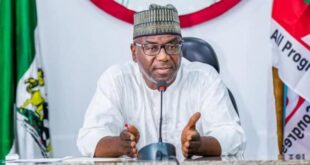The Nigerian naira has continued to lose value against the US dollar in the parallel market, also known as the black market, where foreign currencies are traded unofficially. According to AbokiFX, a website that tracks the exchange rates of major currencies in Nigeria, the naira was trading at N1,100 per dollar as of Thursday, October 19, 2023. This represents a 10% depreciation from N1,000 per dollar on Monday, October 18, 2023.
The naira’s slump in the parallel market comes amid a shortage of foreign exchange supply in the official market, where the Central Bank of Nigeria (CBN) sells dollars to authorised dealers at a fixed rate of N410.25 per dollar. The CBN has been struggling to meet the demand for dollars from importers, manufacturers, and other businesses that need foreign currency to pay for goods and services.
The CBN has also been cracking down on illegal operators and speculators in the parallel market, whom it accuses of manipulating the exchange rate and undermining its efforts to stabilise the naira. The CBN recently announced that it would stop selling dollars to bureau de change (BDC) operators, who are licenced to buy and sell foreign currencies in small amounts. The CBN said that BDCs had become a conduit for illicit financial flows and money laundering and that they were charging exorbitant rates to customers.
The CBN’s decision to cut off BDCs from its dollar supply has led to a surge in demand for dollars in the parallel market, where BDCs and other unregulated traders source their foreign currency. This has put more pressure on the naira, which has depreciated by over 70% in the parallel market since January 2023, when it was trading at N640 per dollar.
The naira’s weakness in the parallel market has implications for inflation, which has been rising steadily in Nigeria due to rising food and fuel prices. According to the National Bureau of Statistics (NBS), inflation rose to 18.7% in September 2023, the highest level since April 2017. The NBS attributed the increase in inflation to the impact of exchange rate pass-through on imported goods and services.
The naira’s slump also affects the purchasing power of Nigerians, especially those who rely on remittances from abroad or have expenses denominated in foreign currency. According to PwC, a global consulting firm, Nigeria received $21 billion in remittances in 2022, making it the sixth-largest recipient of remittances in the world. However, due to the wide gap between the official and parallel exchange rates, Nigerians who receive remittances through official channels lose a significant amount of value when they convert their dollars to naira.
Some analysts have called for a devaluation of the naira in the official market, arguing that it would help narrow the gap with the parallel market and reduce distortions in the foreign exchange market. They also say that a devaluation would boost Nigeria’s exports and attract more foreign investment into the country.
However, others have cautioned against a devaluation, saying that it would worsen inflation and increase the debt burden of the government and businesses that have borrowed in foreign currency. They also say that a devaluation would not address the underlying structural issues affecting Nigeria’s economy, such as low productivity, poor infrastructure, insecurity, and corruption.
Subscribe to the Advocate News letter and receive news updates daily in your inbox.
 Advocate.ng Latest news update on politics, entertainment, sport and more
Advocate.ng Latest news update on politics, entertainment, sport and more




